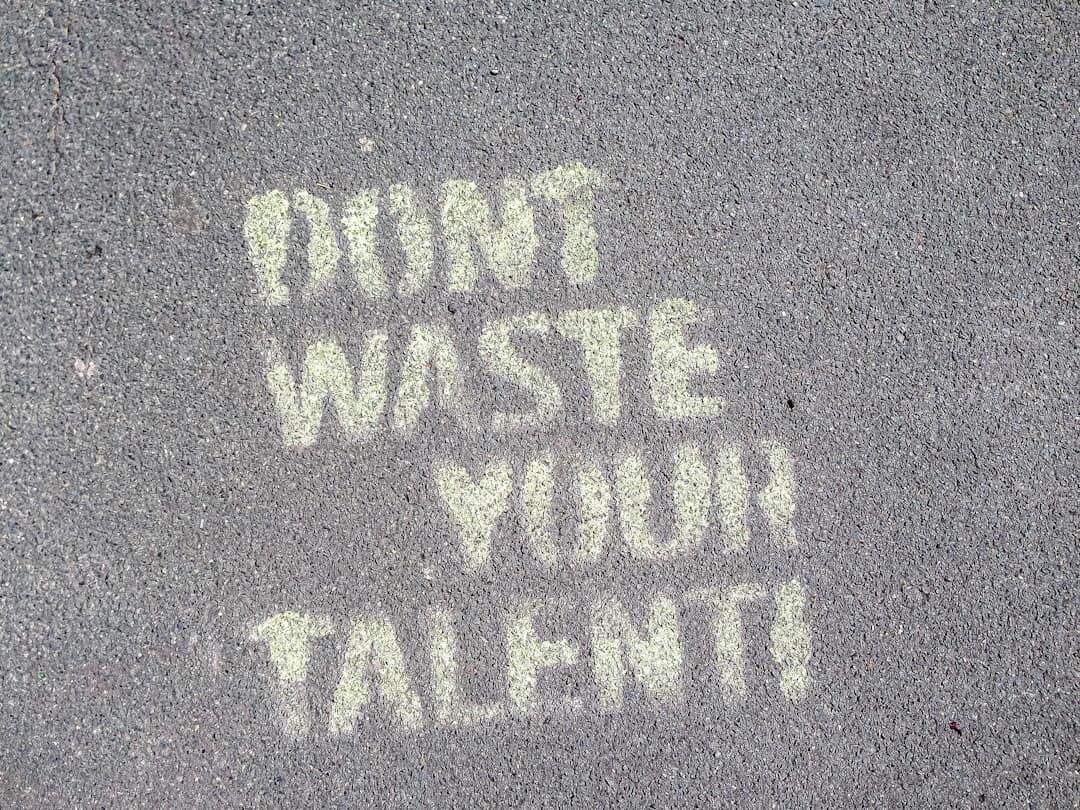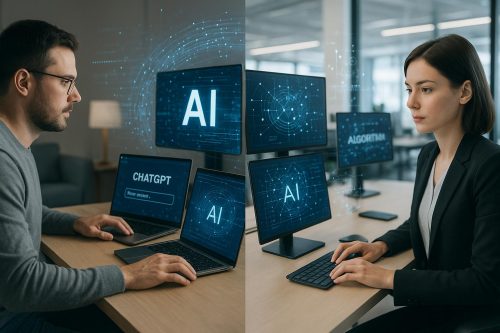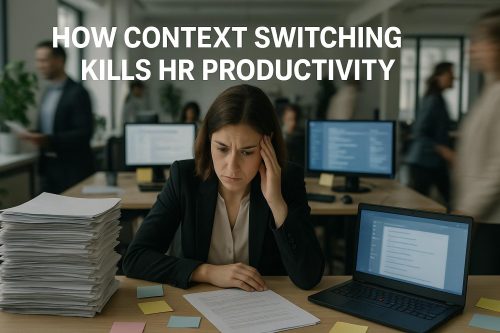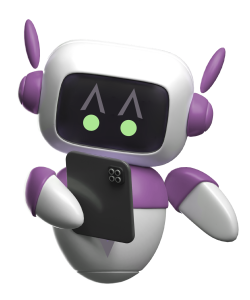Feeling overwhelmed by stacks of resumes? Tired of drowning in onboarding paperwork? AI in HR might be the solution. Picture this: software handling the behind-the-scenes legwork, so HR leaders and professionals can devote their time and energy to what they do best – building connections and driving success. Want to make HR tasks, including talent acquisition, less of a grind? AI-powered tools can lend a hand with things like hiring, reviews, and more, freeing up time for the good stuff.
The rules of the game are changing in HR. Generative AI is unlocking a new level of precision, from workforce planning to crafting bespoke development plans that yield meaningful results. Let’s flip the script: instead of fearing AI as a workforce replacement, explore how it can supercharge HR teams. Ready to trade in overwhelm for a more streamlined you?
With AI on the scene, HR departments are experiencing a radical shift – going from paperwork piles to people-centric strategy planning.
Managing employee records, issuing payroll, and administering benefits are just a few tasks that HR professionals are now able to offload to AI, freeing up more time for strategic decision-making. An Eightfold AI study found 78% of HR leaders rely on AI for records, and 77% use artificial intelligence for payroll and HR benefits.
This use is rapidly increasing. Research predicts 80% of top companies will use AI/ML by 2025. With artificial intelligence being used to tackle core HR tasks, the consequences are far-reaching, as Computerworld’s recent report attests. This seismic shift has major implications for the industry.
Recruiting and Hiring with AI
AI is transforming hiring. Think automated resume screening, qualification checks, and interview scheduling. Recruitment tasks are no match for AI’s broad reach.
Candidates receive messages that speak to them when generative AI and other AI tools are integrated into platforms like LinkedIn and GitHub, the chances of mutual interest and exchanges can drastically increase. With outreach refined, managers can now direct their attention to identifying top performers. Applicant tracking systems powered by AI offer further enhancements.
Recruiters rejoice – these AI solutions put more hours back in their day and propel the hiring process forward at lightning speed. Two key strengths they bring to the table are diagnosing skill shortages and recognizing when a candidate’s values align with those of the organization.
Onboarding and Offboarding Automation with AI
AI technology has improved substantially since the introduction of generative AI tools, so AI capabilities in HR eliminate onboarding headaches. Generative AI can craft job descriptions and other AI tools can handle new-hire paperwork, everything from document checks to training resources falls neatly into place, saving you time and goodwill.
Imagine being able to offload the administrative heavy lifting of onboarding, freeing you up to focus on what really matters – building a strong, productive team that can hit the ground running from day one. From customized educational plans to seamless benefits registration, it makes life easier.
Streamlining Learning and Development with AI
Want learning materials targeted to each employee? AI in HR makes it possible. Instead of generic training, employees receive personalized training tailored to their needs, fostering skills gap closure. And, for personalized learning a generative AI solution, employees can ask specific questions for individual answers which elevates the employee experience.
Learning becomes a one-on-one affair with this hyper-relevant approach. Sparks meaningful progress in your career while organizing your educational path. Imagine being able to curate training experiences that knock it out of the park for every single employee – that’s exactly what happens when HR teams pair up with machine learning experts to fine-tune their learning journeys.
With AI, performance management gets a serious boost – instant access to hard numbers and smart insights based on employee data lets you make data-driven decisions, which can also elevate the employee experience.
The Benefits of AI in HR
Using AI in HR benefits everyone . With AI on the job, HR leaders can break free from money woes and unleash fresh investment in their most valuable asset: their teams. Handing off routine tasks to AI leaves HR teams with the mental bandwidth to think big-picture and craft a better workforce.
Savings freed up by smart budgeting get invested in staff development, paying off big time for everyone. AI infusion in human resources means having a variety of options, all geared to tackle distinct pain points, including: the recruitment process, content creation for training programs, workforce management, and employee onboarding.
Boosting Decision-Making with AI
HR decisions should be data-driven, not based on gut feelings. Data visualization dashboards present relevant HR data to improve decision-making. One AI’s specialty is parsing through workforce data to deliver data-driven guidance for more effective talent management strategies.
Whether you’re hand-picking top talent or building perks that please, every move matters. With AI analytics, the path to smart business decisions becomes crystal clear – no more stab-in-the-dark moves or missed opportunities. . As a result,we start seeing growth spike,from tiny tweaks to giant leaps. Predictive analytics powered by machine learning further strengthens data-driven decisions.
Increased Efficiency through Automation
HR automation speeds up administrative duties like sorting job applications, verifying qualifications, organizing onboarding, and scheduling video interviews. The monotony of administrative work suddenly disappears, and HR teams are reborn – dynamic, driven, and free to rewrite the rules of workforce engagement. For example, generative AI can draft informative blog posts, snappy social media updates, and fully baked answers to the questions on everyone’s mind.
Two areas where AI really delivers are writing effective job postings and vetting early-round applicants with ease. Imagine having a magic wand that makes the task of managing job applications easier, faster, and more accurate – that’s what this solution offers human resource teams.
Considerations When Implementing AI
Recognize AI’s limitations. Not every issue is reducible to data points. Some HR matters require more nuanced consideration than a data printout.
For example, resume gaps may reflect life events. Allow candidates to explain their circumstances. Get the lowdown on how to strike a balance between human touch and technology that supports most every HR function. Behind every powerful machine learning algorithm is a careful hand guiding its implementation.
Data Privacy Considerations
Tech advancements raise data security concerns. Ensure sensitive data remains protected. Employees and applicants need assurance their confidential information is handled responsibly.
You can bet your bottom dollar on a system that’s serious about safeguarding your data – it’s a trustworthiness trait. Honestly, data secrecy has no place in our books; everything should be upfront and honest. Data privacy considerations are paramount when implementing any AI tool in HR.
Frequently Asked Questions about AI in HR
How is AI being used in HR?
Humans are no longer alone in HR: AI is lending a helping hand in multiple areas. This includes talent acquisition (matching candidates to roles, resume screening), employee engagement (sentiment analysis), onboarding automation, and performance management. Say goodbye to tedious tasks like writing job descriptions from scratch or scouring employee reviews for valuable insights – this tool has got you covered.
In the hunt for the ultimate HR sidekick, you want to know which AI tool takes the cake, right?
The ideal AI-powered HR tech depends on specific needs. Businesses vary, and no single product fits all. Contact several providers to understand their capabilities. Consider your goals, budget, and the specific HR tasks you want to automate. See if the platform offers learner profiles and harmony with your current LMS – it makes a big difference.
Will machines soon be running the HR department?
While AI transforms HR responsibilities, it’s unlikely to entirely replace human resources professionals, at least in the near future. While machines can process data, they can’t replace the discerning eye and conscience of a human being, at least not yet. While AI can handle the grind, the magic happens when humans are involved, providing context, empathy, and clever problem-solving.
The biggest question on everyone’s mind: will AI take our jobs?
Forget the rumors – AI is here to give HR teams a boost, not replace them. Routine tasks get handed off, freeing up teams to refocus on brainwork that truly counts – weighing options, making judgement calls, and driving real results. Skills gaps shouldn’t hold HR teams back – that’s where AI comes in, empowering them to make a more meaningful impact.
Conclusion
Integrating AI in HR isn’t about replacing your workforce with robots. Meaningful gains start with hunting down potential hotspots for improvement. Imagine HR teams unhindered by paperwork and instead pouring their energy into fostering a workplace where everyone thrives – that’s what AI makes possible.
HR gets a major boost from AI, streamlining operations, making data-backed calls, and – crucially – taking care of the people who make it all happen. By putting strategy at their fingertips, HR departments and people teams can leave the day-to-day drudgery behind. What this does is grant organizations the power to pivoting smoothly in response to those unexpected twists and turns the market takes.
Time wasted on tedious tasks means opportunity lost. Automate them, and productivity takes off. Freed from routine tasks, HR professionals can refocus on building high-caliber systems and spearheading critical initiatives. With AI on their side, HR teams can finally respond quickly to employee needs and stay one step ahead.






